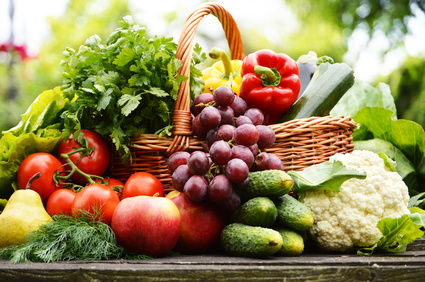
- There are way too many genetically modified organisms (GMO) and processed foods at supermarkets today. This makes it harder to discern which foods are healthy and which foods you should avoid.
- Some foods are labeled organic foods, but may not be fresh.
- Some are labeled as “healthy” or” all natural”, but contain artificial flavoring or preservatives.
- It is important to educate yourself before you go shopping.
- Shop smart, read the labels and also read between the lines.
- Let’s take a look at the best signs of high quality foods.
- Fresh, organic, & no GMOs:
- These three are extremely important. Organic refers to the way farmers grow their food. Organic farmers do not use chemicals or fertilizers on their crops to keep pests and weeds away. They also do not use GMOs to produce their crops. Make sure to always check labels to ensure that the organic food you are buying is fresh.
- Grown in a healthy way:
- The best way to make sure that food is grown in a healthy way is by going to farmers markets. This way, you can talk directly to the farmers and find out how they grow their food.
- No antibiotics:
- Some livestock are treated with antibiotics, which can cause detrimental effects to humans, including a resistance of viruses to antibiotics. According to a report by the U.S. Food and Drug Administration (FDA), factory farms used 29 million pounds of antibiotics on livestock in 2009 alone. The European Union has even banned the use of antibiotics in their food.
- No artificial flavors:
- Artificial flavors may contain genetically modified products and should be avoided. Artificial sweeteners have shown detrimental health effects.
- No pesticides:
- Many factory farms use chemical pesticides, which can leech into the structure of the foods we eat. A report from the Environmental Protection Agency states: “Pesticides can cause health problems, such as birth defects, nerve damage, cancer, and other effects that might occur over a long period of time.”
- No chemicals:
- Real and fresh foods don’t need chemicals. Read the labels.
- Our rule is simple: If you cannot pronounce the ingredients, this food is probably not good for you.
- No chemical fertilizers used:
- Organic farmers do not use chemical fertilizers to promote plant growth; rather, they use natural fertilizers such as manure or compost, which don’t contain harmful chemicals.
- No preservatives:
- Fresh and real foods do not need chemical preservatives. However, since real foods are perishable, you must make sure to buy only what you need in order to save money.
- Not grown in a factory farm:
- Factory farms may use GMOs, antibiotics, chemical fertilizers, pesticides, and everything else we are to avoid. So it is better to just avoid factory farms all together and buy from local farmers.
-
- Now you are ready and can start shopping for real, fresh and organic foods and lead a healthy life!
- Note: The content on our website is for educational purposes only. Please consult your health practitioner or a qualified expert.
-
- For foods you must eat organic.
- For all you need to know about GMOs.
- For a list of GMO-free food companies.
- For the 7 dangers of artificial sweeteners.
-
- REFERENCES:
- 1. “Organic Foods: Are They Safer? More Nutritious?” Mayo Clinic. Mayo Foundation for Medical Education and Research, n.d. Web. 27 Apr. 2014.
- 2. “The European Ban on Growth-promoting Antibiotics and Emerging Consequences for Human and Animal Health.” Oxford Journals. Journal of Antimicrobial Chemotherapy, 2003. Web. 29 Apr. 2014.
- 3. “Overuse of Antibiotics in Livestock Threatening Food Safety.” Mercola.com. N.p., n.d. Web. 30 Apr. 2014.
- 4. “Antimicrobials Sold or Distributed for Use in Food-Producing Animals.” FDA.gov. U.S. Food and Drug Administration, 2009. Web. 29 Apr. 2014.
- 5. “Pesticides and Food: Health Problems Pesticides May Pose.” EPA. Environmental Protection Agency, n.d. Web. 30 Apr. 2014.


















